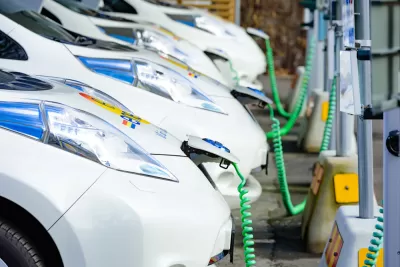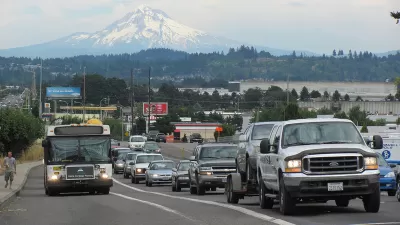A controversial new sales tax on motor vehicles in a state with no sales taxes survived a court challenge. As a result, Oregon consumers will have another reason to consider purchasing or leasing an electric vehicle: receiving up to a $5,000 rebate.

The Oregon Supreme Court ruled on August 2 that revenues from a new half-cent sales tax, technically known as a vehicle privilege tax, can go toward the newly established Oregon Clean Vehicle Rebate Program administered by Department of Environmental Quality "to provide rebates to Oregonians who purchase certain types of electric vehicles (including plug-in hybrid electric vehicles) and other qualifying zero-emissions vehicles (ZEVs)," according to DEQ's press release.
The lawsuit [pdf], filed last November by AAA Oregon/Idaho, the Oregon Trucking Associations, and a used-car dealership, was about how the privilege tax revenues could be used. The plaintiffs "say the tax is barred by a voter-approved 1980 law that all vehicle taxes go to a fund to build and maintain state roads and highways," reported The Bulletin (via Planetizen). Also, see Gordon R. Friedman's Nov. 13 article in The Oregonian.
AAA was downright cordial in their Aug. 3 response to the court ruling.
AAA Oregon/Idaho is pleased with the clarity provided by the Oregon Supreme Court on the privilege tax. The Court’s opinion states that the privilege tax falls outside the purview of the Highway Trust Fund.
The tax was one of several user fees, most significantly a phased, 10-cents per gallon gas tax increase, established to "Keep Oregon Moving," the name for House Bill 2017 that the legislature passed in July 2017. [See fact sheet (pdf).]
Oregon Gov. Kate Brown (D), who almost a year ago launched a state-wide tour to celebrate her signing of the landmark bill, had highlighted the two new EV rebate programs funded by the privilege tax at a stop in Eugene where she met "electric vehicle (EV) manufacturers and dealers, local bike advocates, and Lane Transit riders," according to her Aug. 28, 2017 press release.
"I appreciate the determination of Legislators and the business community to work toward this shared vision of improving the economy of Oregon, while affirming our commitment to innovate, tackle climate change, and build a more resilient state for future generations," said Brown at the time.
Two rebates are available for residents, as posted last September:
Depending on the battery size, consumers who purchase or lease an electric vehicle with a retail price less than $50,000 are eligible to receive a rebate up to $2,500, similar to the current California program.
The program goes further by establishing a "Charge Ahead Oregon Program" [pdf] that establishes additional rebates up to $2,500 to low and moderate income residents who retire their high-emission vehicles and purchase new or used EVs. [California has a similar supplemental rebate for low and moderate income consumers. Residents need not scrap a vehicle to qualify]
"One of the goals of the initiative is to have 50,000 or more registered and operating electric vehicles (EVs) in the state by 2020, according to Oregon Department of Environmental Quality (DEQ) air quality planner Rachel Sakata," reports Catherine Morehouse for Utility Dive. In the "Dive Insight" part of her piece, Morehouse discusses EV programs in other states, not just those which reward EV drivers, but those that require owners of EVs and even hybrid vehicles to pay special fees.
While the privilege tax was the only part of HB 2017 to be litigated, other revenue measures, including the nation's first bike tax and what may be the nation's first plan to toll entire interstates, have also attracted opposition.

Study: Maui’s Plan to Convert Vacation Rentals to Long-Term Housing Could Cause Nearly $1 Billion Economic Loss
The plan would reduce visitor accommodation by 25,% resulting in 1,900 jobs lost.

North Texas Transit Leaders Tout Benefits of TOD for Growing Region
At a summit focused on transit-oriented development, policymakers discussed how North Texas’ expanded light rail system can serve as a tool for economic growth.

Using Old Oil and Gas Wells for Green Energy Storage
Penn State researchers have found that repurposing abandoned oil and gas wells for geothermal-assisted compressed-air energy storage can boost efficiency, reduce environmental risks, and support clean energy and job transitions.

Private Donations Propel Early Restoration of Palisades Playground
Los Angeles has secured over $1.3 million in private funding to restore the Pacific Palisades playground months ahead of schedule, creating a modern, accessible space that supports community healing after recent wildfires.

From Blight to Benefit: Early Results From California’s Equitable Cleanup Program
The Equitable Community Revitalization Grant (ECRG) program is reshaping brownfield redevelopment by prioritizing projects in low-income and environmental justice communities, emphasizing equity, transparency, and community benefits.

Planting Relief: Tackling Las Vegas Heat One Tree at a Time
Nevada Plants, a Las Vegas-based nonprofit, is combating the city’s extreme urban heat by giving away trees to residents in underserved neighborhoods, promoting shade, sustainability, and community health.
Urban Design for Planners 1: Software Tools
This six-course series explores essential urban design concepts using open source software and equips planners with the tools they need to participate fully in the urban design process.
Planning for Universal Design
Learn the tools for implementing Universal Design in planning regulations.
Ascent Environmental
Borough of Carlisle
Institute for Housing and Urban Development Studies (IHS)
City of Grandview
Harvard GSD Executive Education
Toledo-Lucas County Plan Commissions
Salt Lake City
NYU Wagner Graduate School of Public Service





























